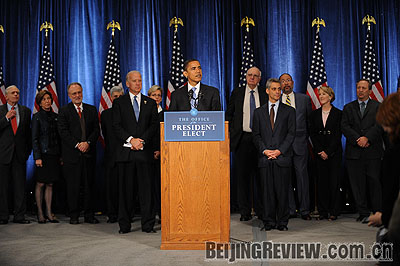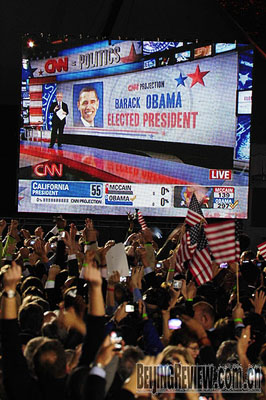|

MORE STIMULI: U.S. President-elect Barack Obama speaks to the press for the first time since his election on November 7 in Chicago, along with his economic advisors (XINHUA/AFP)
In some sense, the economic chaos this fall helped Barack Obama make history as the first African American to be elected president of the United States. Now the president-elect, who campaigned on "hope" and "change," just has to figure out what to do about it.
And he has little time to prepare before he assumes office on January 20 as the 44th president of the United States. At his first post-election news conference held on November 7 in Chicago, Obama sent a strong signal that he would move quickly to address the nation's financial and economic problems.
 NEW HOPE: Supporters cheer in Chicago on November 4 as Barack Obama's election victory is announced
NEW HOPE: Supporters cheer in Chicago on November 4 as Barack Obama's election victory is announced
The news conference came as the country reported 240,000 jobs lost in October, a number much bleaker than forecast that marked the 10th consecutive month of rising unemployment and brought total job losses this year to 1.2 million.
In the last two months, the epicenter of the economic earthquake has shifted from the financial system on the Wall Street to the working families on Main Street, said economist Paul Krugman, appearing on CNN's Lou Dobbs Tonight program on November 9. Now it is essential to talk about jobs and support Main Street, he said.
That concern tops Obama's agenda. Joined on stage by 16 of his heavyweight economic advisors, an Obamanomic dream team consisting of former Treasury secretaries, business leaders and financial experts, Obama outlined his priorities at the news conference.
First on his economic to-do list for the next few weeks is a "rescue plan for the middle class," including job creation and extension of unemployment benefits. He also plans to address the spread of the financial crisis into other economic sectors and to review the current Bush administration's financial program.
Another stimulus package
To carry out his ambitious economic plans, after the election, Obama first urged Congress to push through a second stimulus package.
"A fiscal stimulus plan that will jumpstart economic growth is long overdue," Obama said at the news conference. He said he wanted to see a package pass "sooner rather than later," and that if it doesn't pass during the lame-duck congressional session, "it will be the first thing I get done as president of the United States."
But he did not specify how much his plan would cost.
"The number we're hearing ranges between $100 billion and $400 billion, so probably somewhere in the middle I would guess," said Michael Feroli, Executive Director of Economic Research at JPMorgan Chase Bank in New York.
But the estimate by economists at Goldman Sachs was even bigger. They predicted that Obama and Congress would work out a stimulus package between $300 billion and $500 billion.
"It would be expensive," Feroli said. But there is widespread agreement that a second stimulus package is needed as the economic crisis continues unabated, Feroli pointed out in an economic research note he wrote on November 7.
"In this economic environment in which monetary policy is providing only limited support, the lift from fiscal policy should be helpful in avoiding a deeper downturn," Feroli said in a written interview with Beijing Review.
With details of the second stimulus plan yet to come from Obama and his economic advisors, neither economists nor the American public know for sure what it will look like.
The first $168 billion stimulus package passed by Congress in February was mostly tax rebates. The one that Obama and House Democrats have been urging will "probably get something like that again," but also include more spending for state and local government construction programs as well as aid to the flailing auto industry, Feroli said. He predicted that the second stimulus plan would be "larger and more diverse" than the first one.
This package, Feroli wrote in the economic research note, could contain an infrastructure program to fund construction projects, consumer tax relief, extended unemployment benefits and additional auto industry relief. The auto industry is "the backbone of American manufacturing and a critical part of our attempt to reduce our dependence on foreign oil," Obama said.
| 